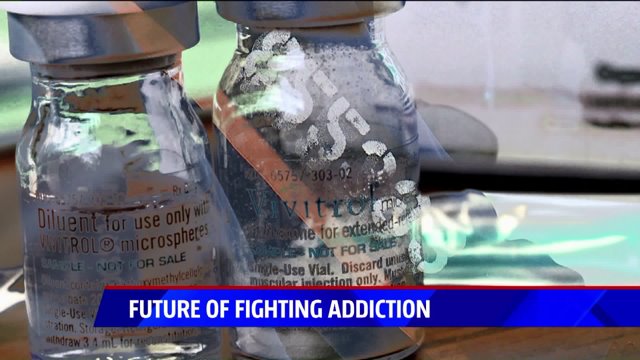DETROIT, Mich. – When Jennifer Herron used crack cocaine for the first time, she was 27 years old. By age 30, she was using it daily. Last December, Herron woke up in an ICU after an overdose. She had tubes in her nose, a tube in her mouth, and doctors told her she suffered heart failure twice. She had been in a coma for three days.
It was after that harrowing experience when Herron finally decided to make a change. She’s now one of seven parolees in the Michigan Department of Corrections participating in a pilot program for a different kind of drug – one that will, for a change, help her.
Vivitrol, made by Irish drug maker Alkermes, may just be the new frontier in the seemingly insurmountable battle against American addiction to alcohol and opioids. Instead of only alleviating withdrawal symptoms like suboxone or methadone, Vivitrol actually cuts off signals to the part of the brain responsible for receiving the effects of opioids and alcohol and thus, eliminates the ability to get drunk or high. You can drink, you can snort, or you can shoot up, but essentially – nothing will happen. Vivitrol was approved to treat alcohol addiction in 2006, and opioid addiction in 2010.
According to the CDC, 91 Americans die daily from opioid overdoses that include heroine and many prescription drugs found in household medicine cabinets across the country.
“It doesn’t discriminate,” said Candis Wright, another parolee and recovering opioid addict in the Vivitrol program. “Race, color, age, it doesn’t discriminate. The drugs were controlling me. I wasn’t in control at all.”
And as former inmates in Michigan, Wright and Herron aren’t alone. The MDOC says 67% of their inmates have substance abuse issues that rise to the rate of addictions, so inside the prison walls, for better or worse, was the perfect place to deploy the potentially lifesaving Vivitrol.
“They’re not going to feel high, they’re not going to get any of that euphoric effect,” said Julia Hitchingham, a Substance Abuse Services Manager with MDOC. “Research shows us that most opioid addicted individuals are not going to be successful without medication and we’re definitely seeing that in our volunteers. They’re very excited to have this opportunity.”
“Normally, because I’m an addict, I have using dreams, and those using dreams usually come…mostly when I go to sleep or if I’m in a deep sleep,” said Wright. “And I’ve had not one. Not one. And that is amazing. That is amazing.”
The shot only needs to be taken once a month to be effective. While it has no addictive properties and no street value, it does cost $1,100 per injection. Luckily, between Alkermes and Medicaid, much of the cost is covered for those who use it. That could all change with the looming possibility of a repeal of the Affordable Care Act.
“We have offenders who are asking us about that,”’ said Hitchingham. “They’re concerned.”
Because it’s too soon to predict what will happen with the ACA, Hitchingham and MDOC are focused on getting more offenders into the Vivitrol program. But it isn’t just available for those who have done or are doing time. Because it’s relatively easy for health care providers to get certified to administer Vivitrol, some federally qualified health clinics are administering the drug to people out in the community. It’s something both Wright and Herron recommend to anyone who is looking for an effective change.
“I have noticed a change since I did the Vivitrol. I have,” said Herron. “My mouth doesn’t water for alcohol, that anxiety kind if feels lifted.”
“Try it, because I did and I didn’t think that I’d be where I’m at. So I’m grateful that, you know, I got a chance,” said Wright. “If I can save someone’s life or at least let them know about it, then that’s what I’m going to do.”




